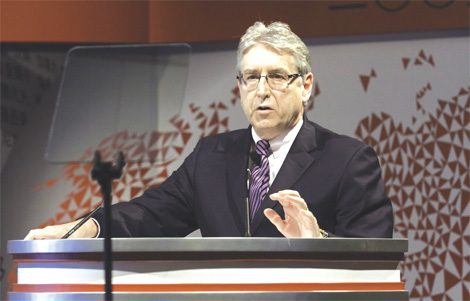HSBC profits come in shy of market estimates
Updated: 2010-03-02 07:28
By George Ng(HK Edition)
|
|||||||||
|
Michael Geoghegan, chief executive officer of HSBC Holdings Plc, speaks at HSBC Plc's annual results news conference in Hong Kong yesterday. HSBC Holdings Plc, Europe's biggest bank, posted full-year net income that missed analyst estimates after costs for bad loans climbed and profit in Asia fell. Jerome Favre / Bloomberg News |
Net full-year profit up 2%, to $5.83 billion, as Asia unit profits dip
HSBC Holdings Plc yesterday reported full-year profits that missed market expectations after credit costs rose following the global financial crisis.
Net profit increased by 2 percent to $5.83 billion from $5.73 billion a year ago. Some analysts had previously forecast double-digit growth in net profit.
Meanwhile, profit before tax dropped 24 percent to $7.1 billion, lower than the $7.8 billion consensus forecast by analysts, due mainly to a huge accounting loss on its own debt.
The lender posted a $6.5 billion technical accounting loss on the value of its own debt for the year, compared with an accounting gain of $6.6 billion in 2008.
"Conditions for the banking sector remained challenging," said Michael Geoghegan, who succeeded Vincent Cheng upon his retirement as Chairman of the Asian unit on February 1.
"As a deposit-rich bank, we felt the considerable impact of low interest rates on our liability spreads," Geoghegan said.
"We make no apology for having continued to position the balance sheet conservatively. Throughout the crisis, HSBC's banking philosophy has remained unchanged: we take deposits first, then we lend," he said.
"Many analysts overlooked the fair value of securities when making projections," said Stuart Gulliver, head of the bank's global business.
Analysts previously forecast an only $5 billion accounting loss on the fair value of the bank's own debt for the year.
Loan impairment charges and other credit risk provisions totaled $26.5 billion, up 6 percent from a year ago but in line with expectations as an improvement in the US market was offset by losses in other regions.
However, the lender said it expects overall impairment charges to decline in 2010.
The bank posted profits in all regions except in North America, with the Hong Kong operation contributing the most.
Operations in the North America zone posted a pre-tax loss of $7.7 billion, down from a $15.53 billion loss in 2008.
The market value of the bank's strategic investments on the mainland increased to $25.4 billion as it expanded its own network to 98 outlets.
Meanwhile, the Hong Kong operation of the global lender posted a pre-tax profit of $5.0 billion, accounting for 71 percent of the group's total pre-tax profit.
The Hongkong and Shanghai Banking Corp Ltd, the Asian unit of the group, posted a net profit of HK$45.8 billion, down 8.9 percent from HK$50 billion in 2008, as the banking sector reeled from the impact of the global financial tsunami.
The group declared a fourth-quarter dividend of 10 US cents per share, unchanged from a year earlier, bringing the total dividend for the whole year to $0.34 per share compared with $0.93 in 2008.
Group Financial Officer Douglas Flint declined to speculate on when the lender could resume growth in dividend payment, emphasizing that growth in dividend payments will hinge on earnings growth.
"I believe basic earnings will grow in the future," he said.
Meanwhile, Peter Wong, chief executive of The Hongkong and Shanghai Banking Corp Ltd, said the bank's Hong Kong staff can expect a salary increase this year.
"There will be a low single-digit increase in salary this year, in line with the market," he said of the salary increase.
The bank said its performance in January was strong and ahead of its expectations.
Looking ahead, Group Chairman Stephen Green said, "Huge challenges and risks remain for all of us," adding, "While emerging markets are leading the global recovery and seem certain to drive the majority of the world's growth in the generation ahead, recovery in developed markets has been slow to start."
(HK Edition 03/02/2010 page2)
